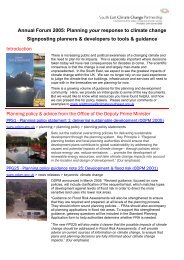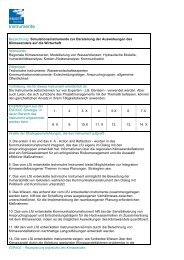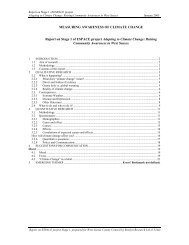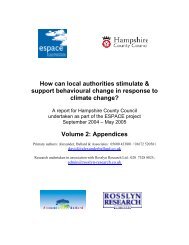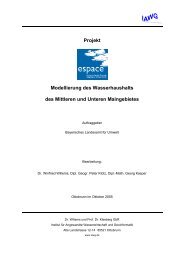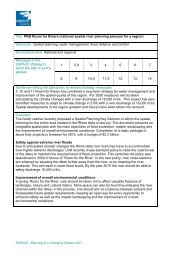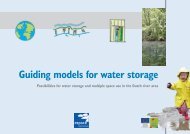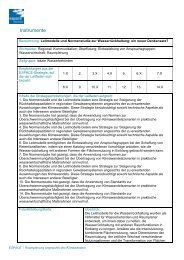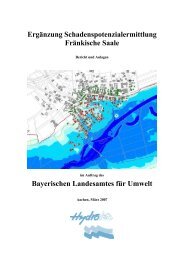Climate Change and the European Water Dimension - Agri ...
Climate Change and the European Water Dimension - Agri ...
Climate Change and the European Water Dimension - Agri ...
Create successful ePaper yourself
Turn your PDF publications into a flip-book with our unique Google optimized e-Paper software.
(cholera). Mosquito borne diseases are more influenced by ambient conditions than<br />
diseases transmitted directly from human to human. In fact, climate changes:<br />
• influence distribution <strong>and</strong> growth rate of vectors,<br />
• alter <strong>the</strong> geographic distribution of pests<br />
• temperature plays a determinant role in vector development, cutting <strong>the</strong> time<br />
necessary to develop from egg to adult <strong>and</strong> fastening <strong>the</strong> generation turn over<br />
(Kiska, 2000).<br />
However, temperature affects also pathogen development within <strong>the</strong> vector (Bouma<br />
et al., 1994): incubation period decreases <strong>and</strong> disease reproduces faster inside <strong>the</strong><br />
pest carrier.<br />
VI.E. Vector-Borne Diseases<br />
Mosquitoes are among <strong>the</strong> first organisms to extend <strong>the</strong>ir range as climate change<br />
make new areas more accessible (Lindsay, 1996). The transmission of infectious<br />
diseases may rise as temperature grows warmer <strong>and</strong> insects migrate northward. As<br />
a consequence, diseases that are typically restricted to tropical <strong>and</strong> subtropical<br />
regions could become more common in northward areas. In North America, malaria<br />
<strong>and</strong> dengue fever are already among <strong>the</strong> new arrivals; Lyme disease already affects<br />
nor<strong>the</strong>rn US regions (http://www.ccah.cpha.ca). Malaria has already appeared in<br />
Canada: during hot, humid period in 1990, locally transmitted malaria occurred in<br />
Toronto as well as in <strong>the</strong> nor<strong>the</strong>astern (New York, New Jersey) <strong>and</strong> north central<br />
(Michigan) United States. It is estimated that 300-500 million people suffer from<br />
malaria every year (WHO, 1993), while over 2 billion people are considered at risk<br />
from contracting disease (Epstein, 2000) with a predicted 3°C rise in global<br />
temperature, an additional 50-80 million cases of malaria will occur each year.<br />
Since 1970 <strong>the</strong> height at which freezing occurs (<strong>the</strong> freezing iso<strong>the</strong>rm) has climbed<br />
approximately 160m within <strong>the</strong> tropical belts, equivalent to almost 1°C warming (Diaz<br />
<strong>and</strong> Graham 1996). Insects <strong>and</strong> insect borne diseases are now being reported at<br />
high elevation in east <strong>and</strong> central Africa, Latin America <strong>and</strong> Asia. Malaria is<br />
nowadays detected in highl<strong>and</strong> urban centers like Nairobi, <strong>and</strong> rural highl<strong>and</strong>s in<br />
Papua New Guinea (Epstein et al., 1998).<br />
Dengue fever is a tropical disease caused by Arbovirus <strong>and</strong> transmitted by <strong>the</strong> bite of<br />
an infected mosquito (genus Aedes). There is no vaccine <strong>and</strong> <strong>the</strong> disease becomes<br />
increasingly fatal with successive infections. (Breslin, 1994). Outbreaks have so far<br />
been restricted to Central America but warming trends due to climate change would<br />
increase <strong>the</strong> range <strong>and</strong> frequency of dengue fever in North America. However<br />
concern arises because, although specific vector are involved in transmission of<br />
malaria <strong>and</strong> dengue fever, even local mosquitoes can become potential vectors <strong>and</strong><br />
<strong>the</strong> cost of mosquito eradication would dramatically increase to control <strong>the</strong> spread of<br />
disease.<br />
200



